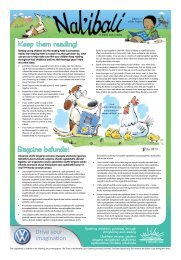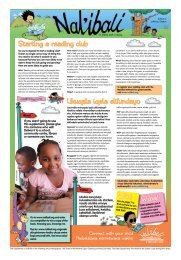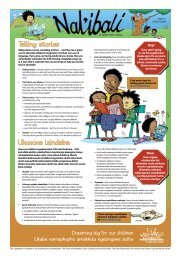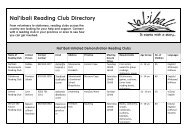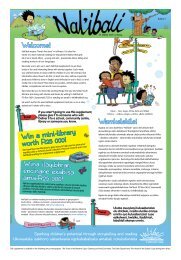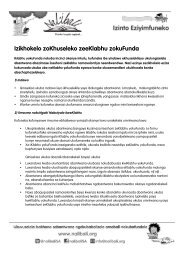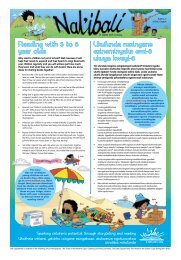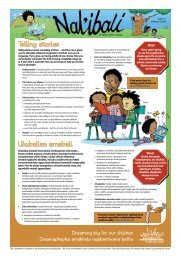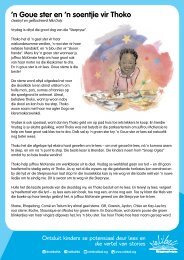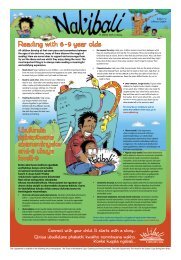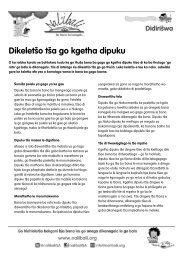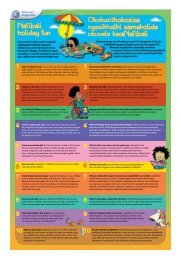Drive your imagination - Nal'ibali
Drive your imagination - Nal'ibali
Drive your imagination - Nal'ibali
You also want an ePaper? Increase the reach of your titles
YUMPU automatically turns print PDFs into web optimized ePapers that Google loves.
Edition 30<br />
isiXhosa, English<br />
Tell a story today!<br />
People have told stories for centuries to explore ideas and<br />
make sense of their experiences. In fact, sharing stories is as<br />
natural to human beings as eating and sleeping!<br />
Making time to tell <strong>your</strong> children stories can be fun and satisfying for everyone.<br />
It also lets <strong>your</strong> children know that you value spending this time with them.<br />
But storytelling has other great benefits too. Here are some of them:<br />
• Storytelling is a great way to teach children the life lessons you want them<br />
to learn. Great stories allow children to explore and think about love, hate,<br />
jealousy, kindness, power, good and evil.<br />
• Storytelling stimulates children’s <strong>imagination</strong> and their use of language.<br />
• Stories can transport and connect them to the lives of people they’ve never<br />
known, who come from long ago and places faraway.<br />
• Telling stories about <strong>your</strong> childhood experiences helps <strong>your</strong> children to<br />
connect with you.<br />
World Storytelling Day is on 20 March 2013! Join us in telling stories to<br />
the children in our lives on that day. Find stories on our website,<br />
www.nalibali.org, or on our new mobi-site, www.nalibali.mobi.<br />
So, how do you get going Well, it’s always easiest to start with stories that you<br />
know. Also, think about which stories will interest <strong>your</strong> listeners and what is<br />
appropriate for their ages. Build up a bank of stories to tell and then keep finding<br />
new ones by looking in books or on the Internet. Translate and adapt stories that<br />
may only be available in one language. Keep them in a special folder or a book.<br />
Practise telling a story by telling it to <strong>your</strong>self until you know it well. Then, as you<br />
tell it to others, remember that <strong>your</strong> voice and <strong>your</strong> body are <strong>your</strong> main tools!<br />
Use them to create pictures in the minds of <strong>your</strong> listeners by using:<br />
• interesting and expressive words<br />
• facial expressions, like scowling to show how angry a character is<br />
• gestures, like stretching out <strong>your</strong> arms to show how wide something is<br />
• expression in <strong>your</strong> voice that gives different characters different sounding<br />
voices, like a soft voice for a shy character.<br />
But, most of all, remember that if you enjoying telling a story, there is a good<br />
chance that <strong>your</strong> audience will enjoy listening to it!<br />
Balisa ibali namhlanje!<br />
Ziinkulungwane zeminyaka abantu bebalisa amabali ngeenjongo<br />
zokuchubelana ngeengcinga bezama nokuqonda ngamava abo.<br />
Eneneni, ukwabelana ngamabali yinto yendalo nenxalenye yempilo<br />
ebantwini njengokutya nokulala!<br />
Ukuzinika ixesha lokubalisela abantwana bakho amabali kungaba lixesha lokuzonwabisa<br />
nelikholisayo kuye wonke ubani. Kananjalo oku kwenza ukuba bazi abantwana bakho<br />
ukuba ukuxabisile ukuchitha ixesha kunye nabo. Kodwa, ukubalisa amabali kunezinye<br />
iinzuzo ngakumbi. Nazi ezinye zazo:<br />
Josh<br />
• Ukubalisa amabali yindlela elunge kakhulu yokufundisa abantwana izifundo<br />
ngezobomi ocinga ukuba kubalulekile ukuba bazifunde. Amabali amnandi<br />
nawonwabisayo avumela abantwana bahlalutye kwaye bacinge ngothando, intiyo,<br />
umona, ububele, ubungangamsha, okuhle kunye nokubi.<br />
• Ukubalisa amabali kuvuselela kukhuthaze ukucinga namandla okuyila<br />
ezingqondweni zabantwana kunye nokusebenzisa kwabo ulwimi.<br />
• Amabali angabathwala abahlanganise nobomi babanye abantu abangazanga<br />
bababona nabakudala okanye nabakwindawo ezikude.<br />
• Ukubalisa amabali malunga namava akho obuntwana kunceda wena nabantwana<br />
ukuba nisondelelane ngokobudlelwane.<br />
Ngoko ke, uqala njani ukwenza konke oku Kaloku, eyona ndlela ilula kukuqala ngamabali<br />
owaziyo. Kwakhona, cinga ngamabali azakuba nomdla kubaphuliphuli bakho kunye<br />
namabali alungele ubudala babo. Zakhele uvimba wamabali owabalisayo uze ungayeki<br />
ukufumana amanye ngokufunda iincwadi okanye ukhangele kwi-Intanethi. Waguqule<br />
uwalungelelanise amabali afumaneka ngolwimi olunye kuphela. Wagcine kwifayile<br />
ekhethekileyo okanye encwadini ekhethekileyo.<br />
Ziqhelise ukubalisa ibali ngokuthi ulibalisele wena buqu kuqala ude ulazi kakuhle.<br />
Emva koko, njengokuba ulibalisela abanye, khumbula ukuba ilizwi lakho nomzimba<br />
wakho zezona zixhobo zakho zokubalisa zingundoqo! Zisebenzise ukudala imifanekisongqondweni<br />
kubaphulaphuli bakho ngokusebenzisa:<br />
USuku lokuBalisa amaBali lweHlabathi lungomhla<br />
wama-20 kweyoKwindla kowama-2013! Ngolo suku,<br />
zibandakanye kunye nathi ekubaliseleni amabali<br />
abantwana abasebomini bethu. Fumana amabali<br />
kwisikhundla sethu somnathazwe esidilesi ithi:<br />
www.nalibali.org okanye kwisikhundla sethu esitsha<br />
somnathazwe imobi esidilesi ithi: www.nalibali.mobi.<br />
• amagama atsala umdla nachaza inkangeleko<br />
• inkangeleko yobuso, efana nokugxelesha ukubonakalisa ukuba umlinganiswa<br />
unomsindo kangakanani na<br />
• izijekulo okanye ukusebenzisa izandla, njengokolula iingalo zakho ukubonakalisa<br />
ukuba into ibanzi kangakanani na<br />
• imvakalo-zwi yakho ukunika abalinganiswa abohlukileyo amazwi ohlukileyo<br />
njengelizwi elithambileyo ukubonakalisa umlinganiswa oneentloni.<br />
Kodwa, okubaluleke kuzo zonke, khumbula ukuba xa ukonwabela ukubalisa ibali, maninzi<br />
amathuba okuba abaphulaphuli bakho nabo baza kukonwabela ukuliphulaphula!<br />
<strong>Drive</strong> <strong>your</strong><br />
<strong>imagination</strong><br />
Read to me. Explore a story.<br />
1<br />
Ndifundele.<br />
Masichubelane ngebali.<br />
This supplement is available in the following Times Media newspapers: The Times in the Western Cape, Gauteng and KwaZulu-Natal; The Daily Dispatch and The Herald in the Eastern Cape during term times.
Chameleon’s clever trick is one of 36 stories<br />
available in the Little Library Kits for Numeracy,<br />
Literacy and Life Skills. Each kit contains 60<br />
readers (5 copies of 12 stories), 12 big books,<br />
12 posters and a comprehensive teacher’s guide.<br />
The readers and the big books are available<br />
in all 11 official languages. For more information please<br />
visit our website www.cup.co.za.<br />
Cambridge University Press<br />
P O Box 50017, V&A Waterfront, 8002<br />
Tel 021-4127800 | Fax 021 4198418<br />
Email info@cup.co.za<br />
www.cup.co.za<br />
Nal’ibali is a national reading-for-enjoyment campaign<br />
to get people in South Africa – children and adults<br />
– passionate about telling and reading stories.<br />
For more information, visit www.nalibali.org<br />
INal’ibali liphulo lesizwe lokufundela<br />
ulonwabo lokwenza abantu eMzantsi<br />
Afrika – abantwana nabantu abadala<br />
– bakuthakazelele ukubalisa nokufunda<br />
amabali. Ukuze ufumane inkcazelo ebanzi,<br />
ndwendwela ku-www.nalibali.org<br />
<strong>Drive</strong> <strong>your</strong><br />
<strong>imagination</strong><br />
Get story active!<br />
After you and <strong>your</strong> children have read The Terrible Graakwa,<br />
try out some of these ideas.<br />
If you have 10 minutes…<br />
• Talk to <strong>your</strong> children about what it means to be scared and about things<br />
that scare them. Ask them to suggest what they can do when they feel<br />
scared.<br />
• Read the story together again, stopping to ask and talk about questions<br />
like these:<br />
– Why do you think the Terrible Graakwa stole the Bird of Peace<br />
(page 3) What is the right thing to do<br />
– Can you find the magic gift that each animal gave<br />
(in the picture on pages 4 and 5)<br />
– Where do you think the Terrible Graakwa is running to in this<br />
picture (page 15)<br />
– What lessons do you think Simphiwe might have learnt from this<br />
experience (page 15)<br />
If you have 30 minutes…<br />
• Read about the gifts that the animals gave Simphiwe on page 5.<br />
Ask <strong>your</strong> children to draw each of these gifts in Simphiwe’s pouch<br />
below. They might want to write words for some of the gifts too.<br />
• Suggest that they write which of the animals’ gifts they would like to<br />
receive and why.<br />
Yenza ibali linike umdla!<br />
Emva kokuba wena nabantwana bakho nifunde ibali elisihloko<br />
sithi iZim eloyikekayo, zama ezinye zezi ngcinga.<br />
Ukuba unemizuzu eli-10…<br />
• Thetha nabantwana bakho malunga nokuba kuthetha ukuthini ukoyika kwaye<br />
zinto zini eziboyikisayo. Bacele ukuba bacebisane ukuba bangenza ntoni xa<br />
beziva besoyika.<br />
• Fundani ibali kwakhona nimane niphumla, nibuzana kwaye niphendule<br />
imibuzo efana nale ilandelayo:<br />
– Ucinga ukuba kwakutheni iZim eloyikekayo lize liyibe iNtaka yoXolo<br />
(iphepha lesi-3) Ingaba ukwenza oko kwakuyinto elungileyo<br />
– Ungasifumana isipho somlingo isilwanyana ngasinye esinikezele ngaso<br />
emfanekisweni (iphepha lesi-4 nele-5)<br />
– Ucinga ukuba iZim eloyikekayo libalekela phi (iphepha le-15)<br />
– Zeziphi izifundo ocinga ukuba uSimphiwe wazifunda kuko konke<br />
okwenzekayo (iphepha le-15)<br />
Ukuba unemizuzu engama-30…<br />
• Funda malunga nezipho izilwanyana ezampha zona uSimphiwe kwiphepha<br />
lesi-5. Cela abantwana bazobe isipho ngasinye esisesipajini sikaSimphiwe<br />
apha ngezantsi. Bangafuna nokuwabhala amagama ezinye zezi zipho.<br />
• Bacebise ukuba babhale ukuba sesiphi isipho sezilwanyana abangathanda<br />
ukusifumana nokuba kutheni bengathanda sona.<br />
Reading<br />
club tip #4<br />
Familiarise <strong>your</strong>self with the<br />
“Story corner” stories on the<br />
back page of each supplement<br />
and then tell them to the children at<br />
<strong>your</strong> club.<br />
Icebiso lesi-4 leklabhu<br />
yokufunda<br />
Ziqhelanise namabali afumaneka<br />
kwicandelo lohlelo elibizwa<br />
ngokuthi “Indawo yamabali”<br />
elikwiphepha elingasemva<br />
lohlelo uze uwabalisele<br />
abantwana kwiklabhu<br />
yakho.<br />
If you have one hour…<br />
• Ask <strong>your</strong> children to think about what a really scary monster would look<br />
like and to describe it. Then, on a large sheet of paper let each child draw<br />
a monster, name it and write enough details about this scary monster<br />
so that if someone comes across it, they will easily recognise it!<br />
(Help younger children with this by writing down what they tell you.)<br />
Ukuba uneyure…<br />
• Cela abantwana bacinge ukuba linokuba likhangeleka kanjani izim<br />
eloyikekayo lamanyhani ze balichaze. Kuxwebhu lwephepha umntwana<br />
ngamnye makazobe elo zim, alithiye igama aze abhale iinkcukacha ezoneleyo<br />
malunga neli zim loyikekayo ukuze ukuba kukho othe wadibana nalo, akwazi<br />
ukulinakana ngokulula! (Nceda abantwana abancinane benze lo msebenzi<br />
ngokubabhalela phantsi oko bakuxelela kona.)<br />
Create <strong>your</strong> own mini-book<br />
1. Take out pages 3 to 6 of<br />
this supplement.<br />
2. Fold it in half along the black<br />
dotted line.<br />
3. Fold it in half again.<br />
4. Cut along the red dotted lines.<br />
Zenzele eyakho incwadana encinane<br />
1. Thabatha amaphepha ama-3 ukuya<br />
kwisi-6 kolu hlelo.<br />
2. Wasonge esiphakathini kumgca<br />
wamachaphaza amnyama.<br />
3. Phinda uwasonge esiphakathini kwakhona.<br />
4. Sika kwimigca yamachaphaza abomvu.<br />
<strong>Drive</strong> <strong>your</strong><br />
<strong>imagination</strong><br />
2
<strong>Drive</strong> <strong>your</strong><br />
<strong>imagination</strong><br />
Fun with poems!<br />
Do you like reading poems Some poems<br />
rhyme, but others don’t. Here are some fun<br />
poems for you to read aloud. Can you also do<br />
actions as you say them<br />
Masonwabe ngemibongo!<br />
Uyakuthanda ukufunda imibongo Eminye imibongo<br />
inemvanosiphelo nezingqisho okwezicengcelezo eminye ayinazo.<br />
Nantsi imibongo yokuzonwabisa onokuyifunda ngokuvakalayo.<br />
Ungakwazi ukuyilinganisa ngokwenza okuthethwayo njengokuba<br />
uyifunda ngokuvakalayo<br />
Look in the mirror<br />
Look in the mirror<br />
What do you see<br />
I see a monkey<br />
Looking at me!<br />
Look in the mirror<br />
What do you see<br />
I see an elephant<br />
Looking at me!<br />
Lo mbongo<br />
umalunga<br />
nokuzibuka esipilini<br />
ujika-jika ubuso<br />
bakho bukhangeleke<br />
njengobezilwanyana<br />
ezohlukileyo.<br />
iSele<br />
Nali isele,<br />
Emva kwendlu kabawo,<br />
Litya lichola-chola,<br />
Lithi ndakuligxotha,<br />
Lith’ukusuka kwalo,<br />
Lithi tsi, gxada tsi.<br />
Lithi tsi, gxada tsi.<br />
This poem<br />
is about a frog<br />
and how it jumps to<br />
get away from<br />
danger.<br />
Look in the mirror<br />
What do you see<br />
I see a zebra<br />
Looking at me!<br />
Look in the mirror<br />
What do you see<br />
I see a cat<br />
Looking at me!<br />
iDonki<br />
Oko ndafelwa ngumama notate<br />
lingxowa zasemaXhoseni<br />
Zithwaliswa mna,<br />
Ndedwa jwi, jwi, jwi, This poem<br />
Ndedwa jwi, jwi, jwi. is about how hard<br />
a donkey works. Since<br />
being orphaned, it is<br />
made to carry all the<br />
heavy bags alone.<br />
I dig, dig, dig<br />
I dig, dig, dig,<br />
And I plant some seeds.<br />
I rake, rake, rake,<br />
And I pull some weeds.<br />
I wait and I watch<br />
And soon, you know<br />
My garden sprouts<br />
And starts to grow.<br />
Lo mbongo<br />
umalunga nokutyala<br />
imbewu, ze uyigade<br />
umane ukuyihlola<br />
uyihlakulela de ikhule<br />
ibe zizityalo.<br />
Be a poet! Yiba yimbongi!<br />
Write the words that you think would make<br />
this a fun poem to read!<br />
Write the title of<br />
<strong>your</strong> poem here.<br />
__________________________________<br />
My _______________________________<br />
and ______________________________.<br />
It ________________________________<br />
and ______________________________.<br />
One day ___________________________<br />
and now ___________________________ .<br />
Bhala amagama ocinga ukuba aya kwenza<br />
konwabise ukufunda lo mbongo!<br />
Bhala isihloko<br />
sombongo apha.<br />
_____________________________________<br />
I ________________________________ yam<br />
kunye ________________________________.<br />
Ihlala _________________________________<br />
kwaye ________________________________.<br />
Ngenye imini ___________________________<br />
Kanti ngoku ___________________________.<br />
The English poems on this page are taken from Poetry, compiled<br />
by Daphne Paizee and published by Cambridge University Press.<br />
Win!<br />
Send <strong>your</strong> completed poem to letters@nalibali.org<br />
or Nal’ibali, PO Box 1654, Saxonwold, 2132, by<br />
19 April 2013 and stand a chance of winning one<br />
of 10 copies of the book, The Happy Prince, in <strong>your</strong><br />
home language! Remember to give us <strong>your</strong> full<br />
name, age, phone number, postal address<br />
and home language.<br />
Phumelela!<br />
Thumela umbongo wakho opheleleyo kumhleli<br />
weNal’ibali kule dilesi ye-imeyili: letters@nalibali.org<br />
okanye kule dilesi yeposi: Nal’ibali, PO Box 1654,<br />
Saxonwold, 2132, kungadlulanga umhla we-19<br />
kuTshazimpunzi kowama-2013 uze ube sethubeni<br />
lokuphumelela incwadi esihloko sithi The Happy<br />
Prince, ebhalwe ngolwimi lwakho lwasekhaya!<br />
Khumbula ukubhala igama lakho elipheleleyo,<br />
ubudala, inombolo yomnxeba, ulwimi lwakho<br />
lwasekhaya kunye nedilesi yakho yeposi.<br />
3
Story corner<br />
Here is the last part of the story about the lion<br />
and the monkey for you to read aloud or tell.<br />
The lion and the monkey<br />
(Part 2) by Ikeogu Oke<br />
Indawo yamabali<br />
Nantsi inxalenye yokugqibela yebali elimalunga nengonyama<br />
nenkawu onokulifunda ngokuvakalayo okanye ulibalise.<br />
Ingonyama kunye nenkawu<br />
(Inxalenye 2) ngu-Ikeogu Oke<br />
In the end the monkey took pity on the lion and lowered his tail into the pit like<br />
a rope. The lion held onto the monkey’s tail and climbed up it. But even when<br />
he was out of the pit, the lion hung onto the monkey’s tail.<br />
“Let me go! Haven’t I helped you out of the deep pit as you begged me to”<br />
the monkey asked the lion.<br />
But the lion tightened his grip on the monkey’s tail even more, and when the<br />
monkey looked into the lion’s eyes, he saw the look of hunger. “Please let me<br />
go!” the monkey cried. But the lion’s grip only got tighter.<br />
Suddenly, an old woman appeared. She was on her way to her farm when<br />
she saw the animals arguing. She stopped and asked them why they were<br />
quarrelling. The monkey told her how he had helped the lion out of the<br />
deep pit. “But now he is holding onto my tail and he won’t let me go,”<br />
he complained.<br />
“Is this true” the old woman asked the lion. The lion nodded in agreement.<br />
Then the old woman said to the monkey, “Clasp <strong>your</strong> hands and say,<br />
‘I am about to die for my kindness. I am about to die for my kindness.’”<br />
So the monkey did this.<br />
The old woman then turned to the<br />
lion and said, “Clasp <strong>your</strong> paws and<br />
say, ‘Someone is about to die for his<br />
kindness. Someone is about to die<br />
for his kindness.’” The lion raised his<br />
free front paw and repeated the old<br />
woman’s words.<br />
“No!” said the old woman, “I said<br />
clasp <strong>your</strong> paws, and I mean <strong>your</strong><br />
two front paws, and then say the<br />
words.” As the lion obeyed her<br />
command and clasped his paws,<br />
the monkey escaped and ran away.<br />
The lion chased the monkey until the<br />
monkey climbed up a nearby tree.<br />
Crestfallen, the lion looked back at<br />
the spot where they had seen the old<br />
woman, but she was no longer there.<br />
Grandpa paused and looked at our faces that had suddenly lit up at the<br />
happy ending for the monkey.<br />
Ekugqibeleni inkawu yayisizela ingonyama yaza yafaka umsila<br />
wayo emngxunyeni ukuze usetyenziswe njengentambo. Ingonyama<br />
yabambelela kumsila wenkawu yagwencela, yenyuka yaphuma. Kodwa<br />
yathi naxa sele iphumile emngxunyeni yaqhubeka iwubambe nkqi umsila<br />
wenkawu.<br />
“Ndiyeke! Andikuncedanga na ndakukhupha emngxunyeni onzulu<br />
njengoko ubundicelile” inkawu yabuza ingonyama.<br />
Kodwa ingonyama yawuqinisa ngakumbi umsila wenkawu. Yathi inkawu<br />
xa ijonga ingonyama emehlweni, yabona indlela ingonyama eyayilambe<br />
ngayo. “Nceda undiyeke ndihambe!” yakhala inkawu. Kodwa ingonyama<br />
yaye iwuqinisa ngakumbi umsila wenkawu.<br />
Ngephanyazo kwathi gqi ixhegokazi. Lalisendleleni eya kwifama yalo<br />
ukubona kwalo ezi zilwanyana zibini zixambulisana. Lema labuza<br />
ukuba zilwela ntoni na. Inkawu yalichazela indlela ethe yanceda ngayo<br />
ingonyama yayikhupha emngxunyeni onzulu. “Kodwa ngoku ibambe nkqi<br />
umsila wam ayifuni kundiyeka ndihambe,” yakhalaza.<br />
“Ingaba oku yinyaniso” ixhegokazi labuza ingonyama. Ingonyama<br />
yanqwala ivuma. Ixhegokazi lathi kwinkawu, “Dibanisa iintupha zakho uthi,<br />
‘Ngoku ndiza kufa ndifela inceba yam.<br />
Ngoku ndiza kufa ndifela inceba yam.’”<br />
Ngokwenene ke, inkawu yenza njalo.<br />
Ixhegokazi laguquka labhekisa<br />
kwingonyama lathi, “Dibanisa<br />
iintupha zakho uthi, ‘Kukho oza kufa<br />
efela inceba yakhe. Kukho oza kufa<br />
efela inceba yakhe.’” Ingonyama<br />
yanyusa inqina layo elingabambanga<br />
nto yaphinda oko yayikuxelelwa<br />
lixhegokazi.<br />
“Hayi!” latsho ixhegokazi, “Ndithe<br />
dibanisa iintupha zakho, kwaye<br />
ndithetha iintupha zakho zamanqina<br />
omabini angaphambili, uze uthethe la<br />
mazwi.” Lo gama ingonyama ithobela<br />
umyalelo wexhegokazi idibanisa<br />
iintupha zayo, inkawu yaphuncuka<br />
Illustration by Jiggs Snaddon-Wood<br />
yabaleka yemka. Ingonyama yayileqa<br />
Imifanekiso nguJiggs Snaddon-Wood<br />
inkawu yade yakhwela emthini<br />
owawukufutshane. Idakumbile, ingonyama yabheka ijonga kwindawo<br />
ababelibone kuyo ixhegokazi, kodwa ixhegokazi lalingasekho apho.<br />
UTatomkhulu wanqumama wasijonga ebusweni,wasifumana sibonakala<br />
sichwayitile kuba inkawu isindile kwingonyama ekhohlakeleyo.<br />
In <strong>your</strong> next Nal’ibali<br />
supplement:<br />
• How to get books for <strong>your</strong><br />
reading club<br />
• Your letters to Nal’ibali<br />
• Mini-book, Oh no!<br />
• The first part of a read-aloud story,<br />
Mini Meerkat makes a friend<br />
Get <strong>your</strong> next Nal’ibali supplement in the week of<br />
15 April 2013. In the meantime, visit www.nalibali.org<br />
or www.nalibali.mobi for more reading and story<br />
tips, stories and inspirational ideas.<br />
Visit our<br />
new mobisite,<br />
www.nalibali.mobi<br />
Ndwendwela<br />
isikhundla sethu<br />
esitsha somnathazwe<br />
imobi kule dilesi<br />
www.nalibali.mobi<br />
Kuhlelo lwakho olulandelayo<br />
lwe<strong>Nal'ibali</strong>:<br />
• Ungayifumanela njani iklabhu yokufunda yakho iincwadi.<br />
• Iileta zakho eziya kuNal’ibali<br />
• Incwadana encinane, Hayi torho!<br />
• Inxalenye yokuqala yebali elifundwa ngokuvakalayo<br />
elisihloko sithi UMini Gala wakha ubuhlobo<br />
Fumana uhlelo lwakho olulandelayo lweNal’ibali kwiveki yomhla we-15<br />
kuTshazimpunzi kowama-2013. Okwangoku, ndwendwela esi sikhundla<br />
somnathazwe www.nalibali.org okanye www.nalibali.mobi ufumane<br />
iingcebiso zokufunda nezamabali ezingaphezulu, amabali kwakunye<br />
neengcinga ezivuselelayo.<br />
Supplement produced by The Project for the Study of Alternative Education in South Africa (PRAESA) and Times Media Education. Translated by Nobuntu Stengile. Nal’ibali character illustrations by Rico.<br />
<strong>Drive</strong> <strong>your</strong><br />
<strong>imagination</strong><br />
4
The Terrible<br />
Graakwa<br />
The Terrible Graakwa is one of 36 stories<br />
available in the Little Library Kits for Numeracy,<br />
Literacy and Life Skills. Each kit contains 60<br />
IZim eloyikekayo<br />
readers (5 copies of 12 stories), 12 big books,<br />
12 posters and a comprehensive teacher’s guide.<br />
The readers and the big books are available<br />
in all 11 official languages. For more information please<br />
visit our website www.cup.co.za.<br />
16<br />
Cambridge University Press<br />
P O Box 50017, V&A Waterfront, 8002<br />
Tel 021-4127800 | Fax 021 4198418<br />
Email info@cup.co.za<br />
Nal’ibali is a national reading-for-enjoyment campaign<br />
to get people in South Africa – children and adults –<br />
passionate about telling and reading stories.<br />
For more information, visit www.nalibali.org<br />
<strong>Drive</strong> <strong>your</strong><br />
<strong>imagination</strong><br />
www.cup.co.za<br />
INal’ibali liphulo lesizwe lokufundela<br />
ulonwabo lokwenza abantu eMzantsi Afrika –<br />
abantwana nabantu abadala – bakuthakazelele<br />
ukubalisa nokufunda amabali. Ukuze ufumane<br />
inkcazelo ebanzi, ndwendwela ku-www.nalibali.org<br />
Fold<br />
Janine Corneilse<br />
Marcelle Edwards<br />
Jamela January<br />
Shirley de Kock<br />
Terry Milne<br />
1<br />
5
Simphiwe was a magical child. He could<br />
hear ants walking under the ground. He<br />
could hear the flutter of butterflies’ wings.<br />
He could even hear the grass growing.<br />
All the animals in the land loved him.<br />
Everyone was happy because the Bird of<br />
Peace had made her nest in their land.<br />
2<br />
USimphiwe yayingumntwana wobugqi.<br />
Wayekwazi ukuva iimbovane zihamba<br />
phantsi komhlaba. Wayekwazi ukuva<br />
ukundanda kwamaphiko amabhabhathane.<br />
Wayesiva nditsho nengca le xa ikhula.<br />
Zonke izilwanyana emhlabeni<br />
zazimthanda. Wonke umntu<br />
onwabile kuba iNtaka yoXolo<br />
yayakhe indlwana yayo<br />
kumhlaba wabo.<br />
Early one morning<br />
Simphiwe heard the<br />
animals crying.<br />
“What’s the matter” asked Simphiwe.<br />
“The Bird of Peace is gone!” cried Giraffe.<br />
“The Terrible Graakwa stole her.”<br />
All the animals were afraid of the<br />
Terrible Graakwa. He was a monster who<br />
lived far away.<br />
Kwakusasa ngenye imini, uSimphiwe weva<br />
izilwanyana zikhala.<br />
“Yintoni ingxaki” wabuza uSimphiwe.<br />
“INtaka yoXolo imkile!” wakhala uNdlulamthi.<br />
“IZim eloyikekayo liyibile.”<br />
Zonke izilwanyana zaziloyika iZim eloyikekayo.<br />
Yayisisilo esasihlala kude kakhulu.<br />
3<br />
6
“I will find the Bird of Peace,” said brave<br />
Simphiwe. Each animal gave him a magic gift<br />
to help him.<br />
“Ndiza kuyikhangela iNtaka yoXolo,” watsho<br />
uSimphiwe oligorha. Isilwanyana ngasinye<br />
samnika isipho somlingo esiya kumnceda.<br />
“Take one of my stripes,”<br />
said Zebra.<br />
“Take five of my spots,”<br />
said Leopard.<br />
“Take our special sounds,” said all the other<br />
animals. The Lion roared. Snake hissed. Jackal<br />
barked. Elephant trumpeted. Fish Eagle cried.<br />
Owl hooted. Mouse squeaked. Simphiwe put<br />
all their sounds in his pouch. Then he sat down<br />
and listened.<br />
“Crooooo!” He heard the cries of the Bird of<br />
Peace far away in the mountains.<br />
4<br />
“Thatha omnye wemigca yam,” watsho uQwarha.<br />
“Thatha abe mahlanu kumachokoza am,”<br />
watsho uHlosi.<br />
“Thatha izandi zethu ezizodwa,” zatsho zonke<br />
ezinye izilwanyana. UNgonyama wagquma. UNyoka<br />
wafutha. UDyakalashe wakhonkotha. UNdlovu<br />
wakhala okwexilongo. UKhozi wakhala. USikhova<br />
wenza umkhulungwane. UMpuku watswina.<br />
USimphiwe wazifaka esipajini sakhe zonke ezi<br />
zandi. Emva koko wahlala phantsi waphulaphula.<br />
“Kru-u-u-u!” Weva izikhalo zeNtaka yoXolo kude<br />
lee ezintabeni.<br />
5<br />
7
Simphiwe walked for seven days and seven<br />
nights. At last he came to the mountain where<br />
the Terrible Graakwa lived.<br />
Simphiwe waited until it was dark. The<br />
Terrible Graakwa was fast asleep. Simphiwe<br />
climbed up to the Terrible Graakwa’s cave.<br />
There was a cage inside the cave.<br />
The Bird of Peace was in the cage.<br />
USimphiwe wahamba iimini ezisixhenxe<br />
nobusuku bazo. Ekugqibeleni wafika kule ntaba<br />
yayihlala iZim eloyikekayo.<br />
USimphiwe walinda kwade kwarhatyela.<br />
IZim eloyikekayo lalikobunzulu ubuthongo.<br />
USimphiwe wenyuka waya emqolombeni weZim<br />
eloyikekayo.<br />
6<br />
Phakathi emqolombeni kwakukho<br />
indlu yokuvalela intaka. INtaka yoXolo<br />
yayivalelwe kule ndlu yentaka. 7<br />
8
Simphiwe took the bird from the cage quietly.<br />
The bird was very happy to be free.<br />
“Croooo roooo!” she sang.<br />
The Terrible Graakwa woke up.<br />
“Where’s my bird Who has taken her”<br />
he shouted.<br />
8<br />
USimphiwe wayikhupha intaka kule ndlu<br />
yayo ngokuthe cwaka. Intaka yavuya kakhulu<br />
yakukhululeka.<br />
“Kru-u-u kru-u-u!” yacula.<br />
IZim eloyikekayo lavuka.<br />
“Iphi intaka yam Ngubani oyithathileyo”<br />
lakhwaza.<br />
9<br />
9
Simphiwe raced down the mountain. He held the bird<br />
tightly. The Terrible Graakwa roared and chased him.<br />
Simphiwe reached the side of a cliff. He took<br />
Zebra’s stripe and rolled it over the side. It grew longer<br />
and longer until it reached the bottom. Simphiwe<br />
jumped onto the stripe and he slid down.<br />
When the Terrible Graakwa tried to slide down, the<br />
stripe broke!<br />
“Ow! Yow! Ouch!” he shouted. He fell to the<br />
bottom of the mountain. Simphiwe ran until he came<br />
to a deep, wide river.<br />
10<br />
USimphiwe wehla intaba ebaleka. Intaka<br />
wayeyibambile eyiqinisile. IZim eloyikekayo lagquma<br />
lamleqa.<br />
USimphiwe wafika eliweni. Wathatha imigca<br />
yeQwarha wayijula kwelinye icala. Yakhula yaya<br />
iba mide ngokuba mide, yada yaya kufika ezantsi.<br />
USimphiwe wakhwela kulo mgca, watyibilika ukuya<br />
ezantsi.<br />
Lathi xa iZim eloyikekayo lizama ukuhla,<br />
yaqhawuka imigca!<br />
“Shu! Shu! Shuu!” lakhwaza. Laya kuwa ezantsi,<br />
ekupheleni kwentaba. USimphiwe wabaleka wada<br />
wafika emlanjeni onzulu, obanzi.<br />
11<br />
10
The Terrible Graakwa was close behind him.<br />
Simphiwe took Leopard’s spots from his pouch.<br />
He threw them onto the river. They grew bigger<br />
and bigger. And then they floated on the water.<br />
IZim eloyikekayo lalisele liza kumfumana. USimphiwe<br />
wakhupha amachokoza eHlosi esipajini sakhe.<br />
Wawajula phakathi emlanjeni.<br />
Aya ekhula ngokukhula. Aza adada apha<br />
phezu kwamanzi.<br />
Simphiwe held the<br />
Bird of Peace and<br />
jumped from spot to<br />
spot across the river.<br />
But when the Terrible<br />
Graakwa tried to follow<br />
them, he sank! Now he<br />
was wet and sore and<br />
very angry!<br />
Simphiwe ran as fast as he could. The Terrible<br />
Graakwa came closer and closer. He tried to<br />
grab Simphiwe. Simphiwe quickly opened his<br />
pouch. Out came all the animals’ sounds.<br />
USimphiwe wayibamba iNtaka yoXolo waza<br />
watsibela kwichokoza ngechokoza, wawuwela<br />
umlambo. Kodwa lathi iZim eloyikekayo xa<br />
lizama ukuwalandela amachokoza, latshona!<br />
Ngoku lalimanzi, lisifa ziintlungu yaye linomsindo<br />
kakhulu!<br />
USimphiwe wabaleka kangangoko wayenako.<br />
IZim eloyikekayo lasondela ngokusondela.<br />
Lazama ukumbamba uSimphiwe. USimphiwe<br />
wakhawuleza wavula isipaji sakhe. Kwaphuma<br />
zonke izandi zezilwanyana.<br />
12<br />
13<br />
11
The big noise hurt the Terrible<br />
Graakwa’s ears. It pushed him<br />
backwards and forwards.<br />
It turned him round<br />
and round. It<br />
threw him head<br />
over heels. He<br />
was scared and<br />
he crawled away<br />
as fast as he could.<br />
Brave Simphiwe and the animals laughed<br />
when they saw the Terrible Graakwa run away.<br />
The Bird of Peace flew back to her nest.<br />
And the Terrible Graakwa never came to their<br />
land again.<br />
14<br />
Le ngxolo ininzi kangaka yazenzakalisa iindlebe<br />
zeZim eloyikekayo. Yalityhalela emva naphambili.<br />
Yalijika-jika, ilijikelezisa. Yalenzisa uqulukubhode.<br />
Loyika, laza lagaqa labaleka kangangoko linako.<br />
USimphiwe oligorha nezilwanyana bahleka xa<br />
bebona iZim eloyikekayo libaleka lisimka.<br />
INtaka yoXolo yabhabha yaya endlwaneni<br />
yayo. Lona iZim eloyikekayo zange liphinde<br />
libuyele emhlabeni wabo.<br />
15<br />
12



